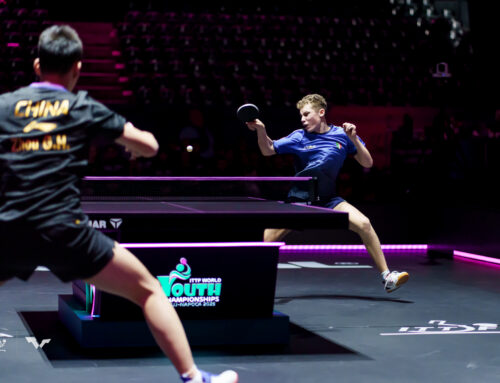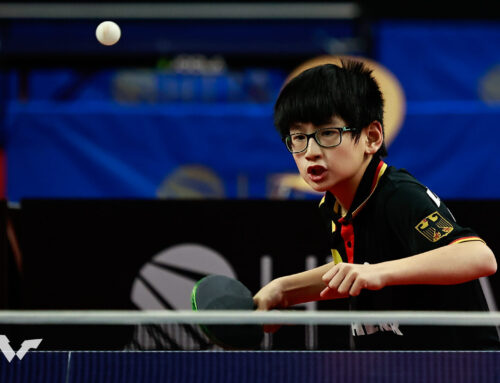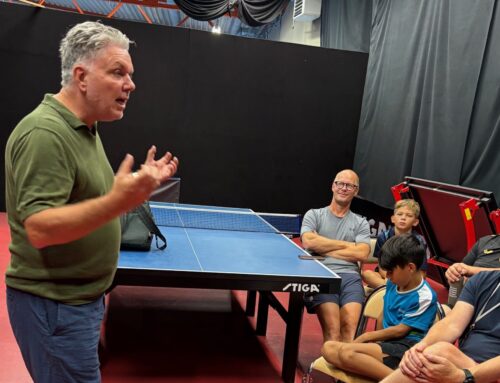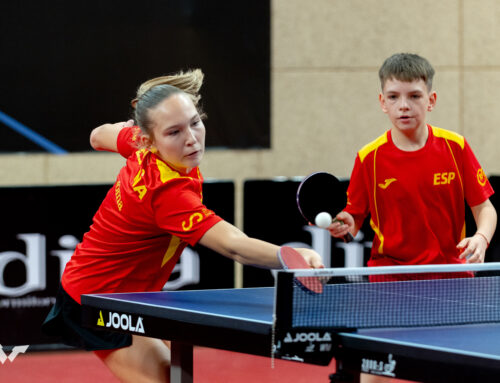Görkem coped with his stress to become champion
He handled the stress of being the favourite in the singles. He also won a gold medal in the mixed doubles. At the U13 European Championships, Görkem Öcal was the most successful player of the tournament.

none
Görkem Öcal does a Darko Jorgic, jumping up on the table like the Slovenian does when he wins a major tournament. Photo: ETTU
“Görkem was stressed before we went to the U13 European Championships in Bucharest,” says his father and coach Gökmen Öcal. “He felt he was the favourite and wanted to win the tournament. When he achieved his goal, he was very, very happy!”
Görkem felt that one player in particular – Azerbaijan’s Onur Guluzade – could stand in his way of becoming champion. And it was in the quarter-finals that they met. Onur plays with a sticky Chinese rubber on the forehand side, which makes Görkem a bit uncomfortable at the table. The ball flies in different trajectories than when using German or Japanese rubbers.
“It was difficult at the beginning,” Gökmen Öcal continues. “But we tried to move Onur away from the table, a tactic that Görkem succeeded in implementing by moving closer to the table himself.”
In the end, Görkem won 5:11, 11:9, 11:2, 11:7. Görkem also won his semi-final against Quentin Sandona of France 3:1. This was the same result against Lukas Wang of Germany in the final.

none
Görkem Öcal with his partner Ela Su Yönter, coached by his father Gökmen Öcal. Photo: ETTU
Tough match against the Swedes
The road to gold in the mixed doubles, teamed with compatriot Ela Su Yönter, was relatively easy, with the exception of one match – against Sweden’s Siri Benjegård and Emil Ellermann.
“Görkem and Ela played the Swedish team twice, both in the mixed team event and in the mixed doubles event,” continues father Gökmen. “They were down 0-2 in both matches but managed to turn them around. The tactic was to reduce the mistakes and stay calm. The basic strategy was for Ela to return the ball on the table and for Görkem to be offensive and try to attack to win the point.”

none
Match point in the mixed final against Moravek/Marsickova from Czech Republic is won. Photo: ETTU

none
Wild celebrations of the Turkish team. Photo: ETTU
Started playing at 5
Görkem Öcal started playing table tennis at the age of five. His father, a former Turkish national team player, was a coach in a small club and Görkem often went there to follow him. After a while, Görkem wanted to play himself. When Gökmen realised that his son had some talent, they moved to Adana, a town not far from Antalya in south-west Turkey. This club had some national team players and was a good environment for Görkem’s talent to grow.
In Adana it did not take long for Görkem to start training three hours after school and five hours on weekends, which is still his weekly training schedule.
Görkem vs. Gökmen
Gökmen plans all the training sessions and competitions. And at the table he decides what Görkem should train. And how. As a former national team player, he knows what it takes to become a good player. And who is the best player in the family?
“Görkem!” says Gökmen without hesitation. “When he was very young and small, I managed to win. Then he would cry and get angry. But from the time he was about nine, he was the stronger of the two of us.
But I also have to mention that the support from compass was crucial for the success in Bucharest. Without it, Görkem would not have won. I love compass!”
Görkem coped with his stress to become champion
Görkem coped with his stress to become champion
He handled the stress of being the favourite in the singles. He also won a gold medal in the mixed doubles. At the U13 European Championships, Görkem Öcal was the most successful player of the tournament.

none
Görkem Öcal does a Darko Jorgic, jumping up on the table like the Slovenian does when he wins a major tournament. Photo: ETTU
“Görkem was stressed before we went to the U13 European Championships in Bucharest,” says his father and coach Gökmen Öcal. “He felt he was the favourite and wanted to win the tournament. When he achieved his goal, he was very, very happy!”
Görkem felt that one player in particular – Azerbaijan’s Onur Guluzade – could stand in his way of becoming champion. And it was in the quarter-finals that they met. Onur plays with a sticky Chinese rubber on the forehand side, which makes Görkem a bit uncomfortable at the table. The ball flies in different trajectories than when using German or Japanese rubbers.
“It was difficult at the beginning,” Gökmen Öcal continues. “But we tried to move Onur away from the table, a tactic that Görkem succeeded in implementing by moving closer to the table himself.”
In the end, Görkem won 5:11, 11:9, 11:2, 11:7. Görkem also won his semi-final against Quentin Sandona of France 3:1. This was the same result against Lukas Wang of Germany in the final.

none
Görkem Öcal with his partner Ela Su Yönter, coached by his father Gökmen Öcal. Photo: ETTU
Tough match against the Swedes
The road to gold in the mixed doubles, teamed with compatriot Ela Su Yönter, was relatively easy, with the exception of one match – against Sweden’s Siri Benjegård and Emil Ellermann.
“Görkem and Ela played the Swedish team twice, both in the mixed team event and in the mixed doubles event,” continues father Gökmen. “They were down 0-2 in both matches but managed to turn them around. The tactic was to reduce the mistakes and stay calm. The basic strategy was for Ela to return the ball on the table and for Görkem to be offensive and try to attack to win the point.”

none
Match point in the mixed final against Moravek/Marsickova from Czech Republic is won. Photo: ETTU

none
Wild celebrations of the Turkish team. Photo: ETTU
Started playing at 5
Görkem Öcal started playing table tennis at the age of five. His father, a former Turkish national team player, was a coach in a small club and Görkem often went there to follow him. After a while, Görkem wanted to play himself. When Gökmen realised that his son had some talent, they moved to Adana, a town not far from Antalya in south-west Turkey. This club had some national team players and was a good environment for Görkem’s talent to grow.
In Adana it did not take long for Görkem to start training three hours after school and five hours on weekends, which is still his weekly training schedule.
Görkem vs. Gökmen
Gökmen plans all the training sessions and competitions. And at the table he decides what Görkem should train. And how. As a former national team player, he knows what it takes to become a good player. And who is the best player in the family?
“Görkem!” says Gökmen without hesitation. “When he was very young and small, I managed to win. Then he would cry and get angry. But from the time he was about nine, he was the stronger of the two of us.
But I also have to mention that the support from compass was crucial for the success in Bucharest. Without it, Görkem would not have won. I love compass!”






